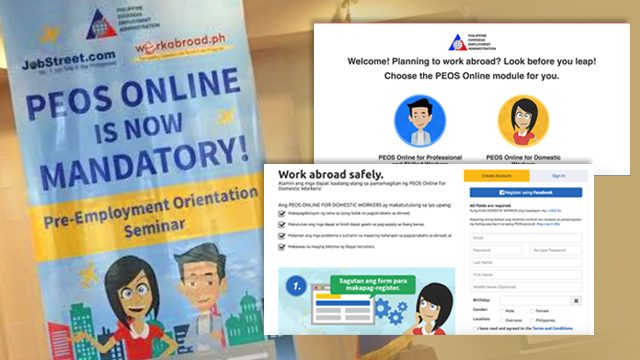SUMMARY
This is AI generated summarization, which may have errors. For context, always refer to the full article.

MANILA, Philippines – Prospective overseas Filipino workers (OFW) are now required to take the Pre-Employment Orientation Seminar (PEOS), which the government made available online since 2013.
Enhancements to the PEOS website was presented to the media on Thursday, June 16, at the Philippine Overseas Employment Administration (POEA) in Mandaluyong City.
These include additional domestic worker modules for professional and skilled workers. Module versions in English, Tagalog, and Taglish are now available as well.
The PEOS is the POEA’s online preventive approach against illegal recruitment. The website, accessible through any device, was developed together with JobStreet.com and WorkAbroad.ph.
According to POEA data, the PEOS website received 502,097 unique visitors from July 2014 to June 2016, with 112,018 registered applicants.
Prior to going online, the PEOS was conducted for free at the POEA’s 16 training centers across the country.
Prospective OFWs are given a seminar about employment contracts, information on their host country, required fees and documents, and the overseas employment certificate.
“Naging mandatory kasi ngayon talaga nakita ng POEA Governing Board ‘yung pangangailangan na magkaroon ng sistema (It was made mandatory by the POEA Governing Board because they saw the need to have a system) whereby [our] job applicants have the necessary access to the right information that will make them well-informed about the positive and negative realities of working abroad,” said POEA Administrator Hans Leo Cacdac.
OFWs, then, will have to take the PEOS apart from the already mandatory Pre-Departure Orientation Seminar (PDOS) being administrated by the Overseas Workers Welfare Administration.
What’s the difference between the two?
“‘Yung PDOS is for those na nakahanap na ng trabaho. Paalis na ‘yan and therefore kailangan ng reminders on information about contact info, who to reach sa embassy, sa abroad, labor attaché, etc,” said Cacdac.
(PDOS is for those who already found work. They’re about to leave therefore, they need reminders on information about contact info, who to reach at the embassy abroad, the labor attachés, etc.)
“Tayo, itong PEOS is more on general public outreach, ‘yung nagbabalak pa lang talagang magkaroon ng information about the positive and negative realities of overseas employment (PEOS is more on general public outrerach, for those who are still mulling over their options and who want to get information about the positive and negative realities of overseas employment),” he added
He explained that the POEA will not process an applicant’s documents if its database showed that or she has not obtained the PEOS completion certificate.
The implementation of this new requirement for OFWs will be prospective in nature.
To stop illegal recruitment
OFWs who wish to avail of their PEOS certificate online only need to register at www.peos.poea.gov.ph.
They will then have to go through the several modules listed under the PEOS Online for Professional and Skilled Workers or PEOS Online for Domestic Workers.
At the end of a module, applicants will be required to answer 3 out of 5 questions correctly before being allowed to proceed to the next module.
Once finished, applicants can immediately secure their certificate through their device.
“Ang projection natin ay magkakaroon ng significant decline in terms of recording ng mga LGU (local government unit) partners ng mga cases ng illegal recruitment kasi nga mas well-informed ang ating mga constituents. Sasabayin din ito ng capability training, mga local enforcement,” said Cacdac.
(Our projection is there will be a significant decline in terms the LGU partners’ records on cases of illegal recruitment because their constituents will be well-informed. This will be complemented by capability training for local enforcement.)
Added burden to OFWs?
Labor Secretary Rosalinda Baldoz hopes that OFWs will not see the PEOS requirement as an added burden in their application process.
“Hindi ito dagdag pahirap dahil kailangan sila mag-go through at matuto ng maraming kaalaman para mas mapatino, mas mapasigurado, mas maging safe ang kanilang pagtrabaho sa abroad. O para makapag-desisyon siya finally kung tutuloy pa ba ko or hindi.” said Baldoz.
(This is not an added burden because they need to learn things to ensure their safety when they work abroad. Or for them to be able to decide if he or she should work overseas or not.)
OFWs have long been complaining of red tape in the various processes they are required to go through so they can work overseas. (READ: Aquino and the continuing plight of OFWs)
Cacdac previously acknowledged that “slow” government processes have made OFWs vulnerable to illegal recruiters. – Rappler.com
Add a comment
How does this make you feel?
There are no comments yet. Add your comment to start the conversation.